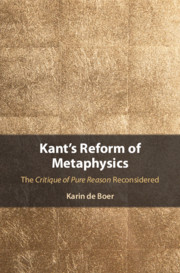Book contents
- Kant’s Reform of Metaphysics
- Kant’s Reform of Metaphysics
- Copyright page
- Contents
- Acknowledgments
- Abbreviations
- Introduction
- Chapter 1 Wolff, Crusius, and Kant
- Chapter 2 The “Thorny Paths of Critique”
- Chapter 3 Ontology, Metaphysics, and Transcendental Philosophy
- Chapter 4 Things in Themselves, Transcendental Objects, and Monads
- Chapter 5 The 1781 Transcendental Deduction of the Pure Concepts of the Understanding
- Chapter 6 The Schematism of the Pure Understanding
- Chapter 7 Transcendental Reflection
- Chapter 8 Kant’s Projected System of Pure Reason
- Conclusion
- Bibliography
- Index of Names
- Index of Subjects
Chapter 2 - The “Thorny Paths of Critique”
Published online by Cambridge University Press: 20 August 2020
- Kant’s Reform of Metaphysics
- Kant’s Reform of Metaphysics
- Copyright page
- Contents
- Acknowledgments
- Abbreviations
- Introduction
- Chapter 1 Wolff, Crusius, and Kant
- Chapter 2 The “Thorny Paths of Critique”
- Chapter 3 Ontology, Metaphysics, and Transcendental Philosophy
- Chapter 4 Things in Themselves, Transcendental Objects, and Monads
- Chapter 5 The 1781 Transcendental Deduction of the Pure Concepts of the Understanding
- Chapter 6 The Schematism of the Pure Understanding
- Chapter 7 Transcendental Reflection
- Chapter 8 Kant’s Projected System of Pure Reason
- Conclusion
- Bibliography
- Index of Names
- Index of Subjects
Summary
The second chapter seeks to clarify how Kant in the late 1760s and early 1770s came to conceive of the aim and main arguments of what was to become the Critique of Pure Reason. It focuses in particular on Kant’s evolving understanding of the act of critique. The heart of the chapter consists in an analysis of the Inaugural Dissertation. Challenging the prevailing view, the chapter highlights the critical impetus of the treatise by arguing that the specific criterion it employs to curb the ambitions of metaphysics – intellectual purity – is directed against an assumption common to Wolff, Crusius, and early post-Leibnizian philosophy in general. Moreover, it puts into perspective the alleged break between the Dissertation and the Critique by arguing that this early instance of critique is preserved in the Critique of Pure Reason. The chapter argues that Kant in this work introduces a new form of critique by arguing that any a priori cognition of objects necessarily rests on pure intuition.
Keywords
- Type
- Chapter
- Information
- Kant's Reform of MetaphysicsThe <I>Critique of Pure Reason</I> Reconsidered, pp. 44 - 72Publisher: Cambridge University PressPrint publication year: 2020

